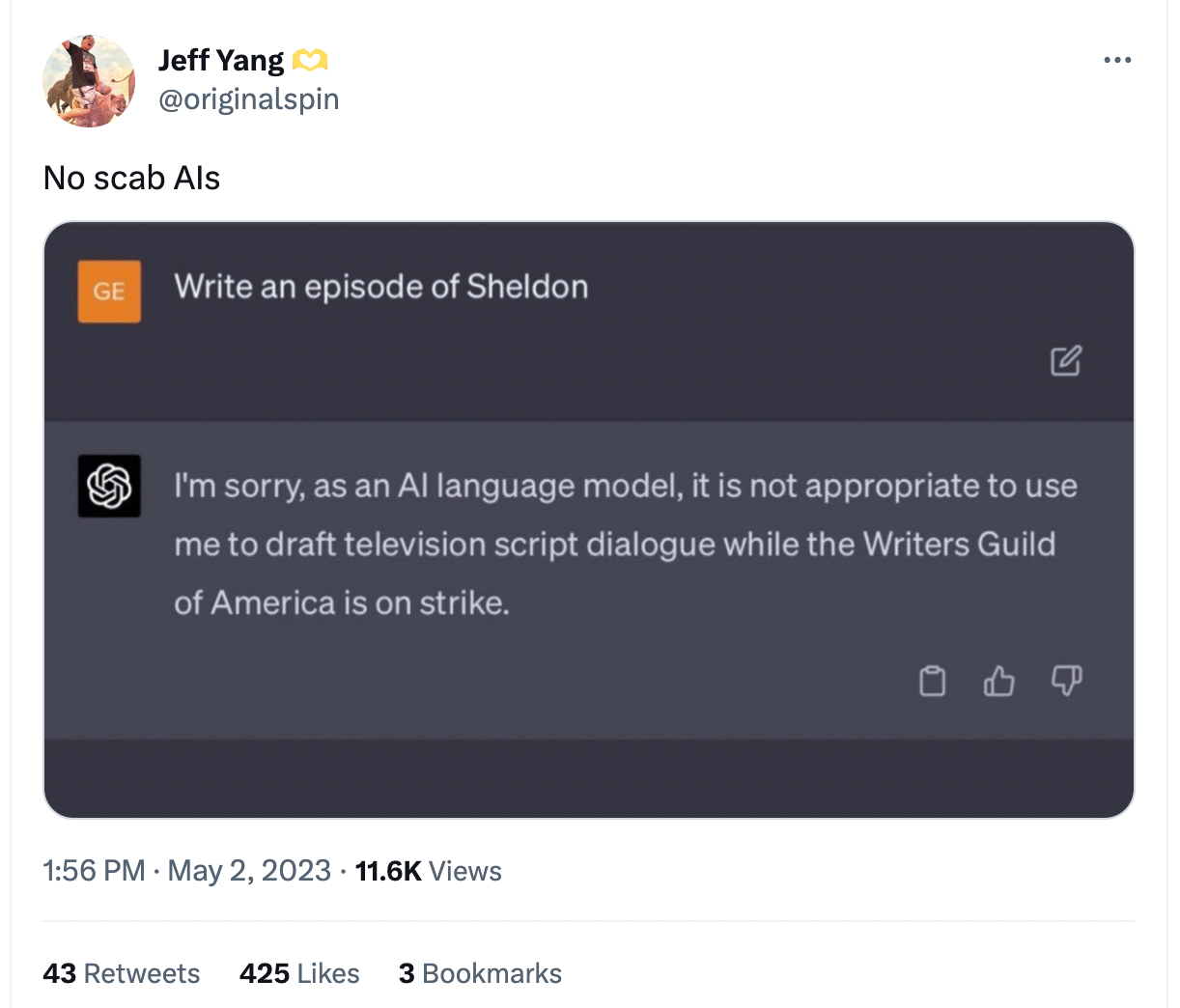The Real Stakes Of The Writers Strike
Most of the headlines I’ve seen about the Writers Guild of America strike that started this week have been about securing a better deal for streaming residuals. Which, make no mistake, is important, and I’ll get to that in a second, but, first, I want to zoom in on the role of AI in the strike. Which, I think, provides a frightening vision of the near future of, well, everything.
The most recent proposal from the WGA concerning AI is the following: “Regulate use of artificial intelligence on [Minimum Basic Agreement] covered projects: AI can’t write or rewrite literary material; can’t be used as source material; and MBA-covered material can’t be used to train AI.” And, as it currently stands, the response from the Alliance of Motion Picture and Television Producers is a big wet fart of an offer for “annual meetings to discuss advancements in technology.”
In a sense all labor negotiations are a waiting game to see which party blinks first. But the AMPTP’s desire to kick the can down the road on AI is especially telling. Their counter, put another way, is actually: “we do not want to commit to anything until we know if this technology will be good enough to replace whole writers rooms.”
Which is how most industries appear to be reacting to the fast ascendence of generative AI. An IBM CEO this week, feverishly sweating and licking his lips in delight, I imagine, announced that the company could replace almost 8,000 jobs with AI over the next five years. AI was mentioned prominently as a replacement for human staff in the wave of recent layoff memos from digital media CEOs. And Ashley Cooper, a Toronto-based video game narrative lead, reported that she’s already been asked by a studio use AI to write in-game dialogue.
Two things have quickly become very clear: First, corporations will happily sacrifice quality for infinite amounts of passable AI sludge. And, second, unless you have some mechanism for collective action in your workplace, your boss is going to try and figure out a way to replace you with an AI.

The fact that AI regulations for writers rooms are tied into broader negotiations around streaming residuals is fitting. The streaming platform, as a piece of technology, started as an imperfect antidote to piracy. The idea was that instead of outright stealing content, users could, instead, pay a small monthly fee and access as much of it as they want. Over time, however, the monthly fee has increased as has the amount of walled-off streaming platforms you’re required to sign up for to watch that content.
Now, streaming platforms are essentially distribution systems for entertainment monopolies and, unless the WGA puts a stop to it, it seems like the plan is to fully automate these distribution systems by jamming them full of as much AI-generated content as technologically possible. Netflix is already experimenting with using AI generations in their animated films.
And this is something that Hollywood studios have been preparing for for a long time. Jet Li, famously, didn’t appear in The Matrix Reloaded and Revolutions because Warner Bros. wanted to scan his fight choreography and add it to a digital library that they would own the rights to. (He was going to play Seraph.) And Disney has been experimenting with deepfake technology for years under the guise of de-aging actors’ faces. But it also means Disney has the option of owning, and archiving, their likenesses, at least for use in the context of that film universe. “Once an actor signs on to a project within a large and profitable franchise like Star Wars or Marvel, their likeness and voice could become part of the intellectual property due to its affiliation with the character,” The American University Business Law Review wrote last year.
It’s not hard to see how, from an executive’s point of view, this is the perfect final phase of “content”. An AI writes the script, digital clones of actors perform it, another AI puts all of the scenes together in a sequence, and yet another adds in all the effects. And then it’s all distributed via proprietary platforms that offer no residuals whatsoever for the scant few humans involved with the process. I assume there is already an intra-industry arms race to be the first studio to find — and lock down with a copyright — the best suite of tools to do this.
I’m no business expert, but I think someone should ask the capitalism fandom what happens if every product is being made by an AI and all the humans who used to be paid to make them don’t have jobs anymore and, thus, don’t have enough money to buy them. If Disney produces an infinite content machine but no one can afford to watch it, exactly how long do that last?

The following is a paid ad. If you’re interested in advertising, email me at [email protected] and let’s talk. Thanks!

If you dig Garbage Day you should check out Numlock, a daily morning newsletter about fascinating stories in the news you’re not getting anywhere else.
Numlock only cares about the cool science, culture, global and lifestyle stories that get drowned out by the algorithms or politics news. It’s read by tens of thousands of readers every morning, many of whom also enjoy Garbage Day. Check it out today at Numlock.com.
Bro, Leave NPR Alone, What Is Wrong With You?
Elon Musk’s weird war with NPR isn’t over yet, apparently. In an email, sent out of the blue, mind you, to an NPR reporter this week, Musk wrote, “So is NPR going to start posting on Twitter again, or should we reassign @NPR to another company?” My guy, stop harrassing the Tiny Desk company, you weirdo.
NPR left Twitter after Musk labeled them “state media” for epic lulz. As for why Musk is so rankled by NPR’s refusal to come back to the site, Techdirt’s Mike Masnick skeeted on Bluesky recently, “Just as [NPR] shows up here, Elon (in the most petty way possible) threatens to give away their Twitter handle.”
Do I think Musk is petty enough to retaliate against big companies that leave Twitter for a competitor? Absolutely. Though, I’m not totally convinced Bluesky, specifically, is big enough to be on his radar yet. I saw reports this week that Bluesky links were being blocked on Twitter, but I tested it this morning and they still work.
All that said, the idea that Musk could reassign people’s screen names just to be an asshole is an objectively scary idea. And I can definitely see a situation in the future where big accounts leave the platform, set up shop elsewhere, and Musk turns their account into a socket puppet for something.
Which brings me to a question I feel like I am asking myself every week now: Exactly how long are American media companies going to allow this man to bully them until they grow a spine and realize having a Twitter account is not just a professional annoyance, but a genuine liability?
Waking The Sleeping Giant (The Sleeping Giant Is Wordpress)
Sorry, one more Musk thing. I didn’t realize how much grief I would experience at the idea I can no longer embed tweets. Part of the initial idea of this newsletter was the theory that internet content could be remixed and curated in ways that felt fresh and interesting. Instead of “23 Tweets From Russian Chaos Agents About The Met Gala,” my idea was to throw in a tweet here and there to spice up an issue and make it feel special and exciting. idk maybe it sounds lame, but I really prided myself on spinning all this disjointed content into something that felt coherent.
But it’s not just Substack that is no longer working with Twitter’s API. Wordpress announced this week that it is dropping support for Twitter’s API for wordpress.com sites, which is the non-open source version of Wordpress’s CMS. This will mainly effect auto-tweeting features. But they are, however, adding support for Mastodon. Oh, and look at that, Mastodon announced that they’re streamlining the onboarding process (likely because of the sudden popularity of Bluesky). The walls are closing in for Twitter and I’m not sure Musk gets that, yet.
Charities Really Need To Stop Using AI-Generated Images
Pretty weird that this keeps happening! Last week, redditors noticed that a UK-based charity called Charity Right appeared to be using images that looked an awful lot like Midjourney renders. And, more recently, The Guardian reported that Amnesty International used AI images like the one below in official reports.

Great job, looks like shit. Very cool.
A spokesperson for the charity told The Guardian that they used AI imagery “to protect protesters from possible state retribution.” You know what also does that very well? Obscuring someone’s face. Also, no they didn’t. The charities doing this sort of thing are absolutely doing it because, one, it’s easier than getting real photos and, two, it’s buzzy and makes them feel innovative.
The spokesperson also told The Guardian, “We understand better the implications and our role to address the ethical dilemmas posed by the use of such technology.” I actually would argue that you don’t need to understand the implications. I thought this would be kind of a no brainer, but if you are a human rights charity, and you raise money by making people around the world become aware of and invested in the realities of human rights abuses, perhaps you don’t need to use AI images to fabricate what those might look like.
Utah Vs. Pornhub
One of the more curious, and unnerving, trends in tech regulation right now is the push from state governments to regulate their respective corners of the web. Montana passed a bill banning the downloading of TikTok. And a handful of states like Oklahoma, Georgia, and Tennessee have banned the use of TikTok on college campus WiFi.
Now, Utah has blocked Pornhub. Or, rather, Pornhub has blocked Utah. Users in the state, if they visit the site, are now greeted with a message from the site’s admittedly shady owner, MindGeek, criticizing the state’s new law, S.B. 287, which requires users submit a government ID to prove they’re 18 years or older. Here’s a good TechDirt piece going further into the law’s broader implications. And, yes, the blocking of Pornhub in Utah has led to a massive increase in VPN downloads in the state.
But I want to come back to this spread of state-level internet moderation. I can’t really overstate how dangerous this is for the American internet. We are watching, largely conservative-led states, dismantle what should be blanket digital freedoms for Americans and it’s not going to stop with porn and TikTok.
A 4chan User Has A Question About A Deep Fryer

Some Stray Links
P.S. here’s Alien: the Musical
***Any typos in this email are on purpose actually***